When we started homeschooling, I heard a lot about something called "notebooking." I had no idea what this was and thought it was a method akin to "classical" or "Charlotte Mason" styles of education. It wasn't until recently that I explored the process and realized that notebooking is not a distinct style of educating but rather a tool that works with a number of styles. Crew members received a lifetime membership to NotebookingPages.com, and we finally attempted "official" notebooking.
So what exactly is notebooking, anyway? At its core, it's a method where students use pen and paper to take notes, write ideas, and/or draw sketches of what they are doing. It lends itself to nearly any subject. After exploring more about the process, I realized notebooking is something I've done probably most of my life. An overly simple example is "read the book or listen to the lecture, and take notes on paper." Simple enough, right?
When I was in grade school, our "notebooking" was pretty much notes given by the teacher and copied from the board, usually in outline form. When I was in high school, we took notes by reading and then outlining, and any notes taken from a lecture tended to follow this "I - A - 1 -a" outline scheme. It worked, but when I got to college and was taking furious notes from lectures, it was hard to keep everything in order, and my note style tended to morph into chunking by ideas. But, if I managed to graduate with honors from high school and college, with nothing but a black marble copybook or a binder filled with looseleaf, what's the big deal about having special "notebooking pages"? After all, what can they do that a plain old basic lined paper can't?
The answer is "Nothing...yet everything." Let me explain.
On one hand, notebooking as a study method really is just writing down what you've learned. It can be outlines, charts or graphs, or even just blocks of ideas scribbled down in some semblance of organization. I think when most students are learning to take notes, you learn by what works best/most easily for the teacher to present. I know that even teaching Matthew to take notes, I started with the outline scheme. Yes, it's simple, but it's also what I have practically ingrained in me -- even my to-do list is often chunked into an outline form. One could argue that it doesn't really matter how one puts the notes down, as long as they have some sort of organization so that you can go back and study them (or accomplish what tasks you've written down). Anything you can write on - a copybook, blank paper, even the back of an envelope works for this, so in this sense, Notebooking Pages is kind of overkill - the "nothing."
Matthew, who is studying a traditional American history course, started with the World Explorers pages. What made this better than a plain copybook was the framework that the Notebooking Pages book provided. First, it contained sections for eighteen of the most well-known explorers to the New World. I'll admit that this made my life easy, but it also allowed Matthew to work independently. Once I gave him a rubric with the information I wanted him to find on each explorer, he was able to work on his own to complete the assignments. Having a section for each explorer made it easy to focus on one man at a time, and keep all of the information about him in one space.
However, the variety of pre-made programs from NotebookingPages.com is not limited to basics like animals (seven land and sea creatures), artist/composers, and explorers. There are also themed copy work pages, biographies (from Presidents and First Ladies to scientists), and holidays. In addition to these, a history notebooking set we found was based on the United States National Parks system. This was perfect for Matthew!
In addition to his general history course, Matthew is using Wonders of the National Parks: A Geology North America from the Great Courses as a spine for a combined course in geology and history of the National Parks Service. In addition to the lecture series, we have been working our way around the country visiting parks and monuments, personally seeing and experiencing these gems. Notebooking Pages contains over 500 printable pages featuring 46 National Parks, 25 National Memorials, and 40 National Monuments, making a significant dent in the list of National Parks Services sites that he is studying. While we were easily able to use a comb binder for collating his Explorers notebook, even a 3-inch binder isn't large enough to accommodate all of these pages!
Hint: if you know you're going to be using a three ring binder, spring for pre-punched paper. It will still print correctly, but you will save yourself a lot of time and aggravation when assembling your binder. For most notebooks, you won't need divider pages, but we found that because this one is so huge, and the parks are being chunked by geographic proximity or geologic features, we were creating chapters that benefited from defined spacing. If you're doing a short unit study, a few pages in a small binding will be sufficient. However, since we're planning on this course to cover two full high school credits, there's going to be a LOT of paper involved.
What I especially like is the flexible structure that the pages from NotebookingPages.com give him. In studying the parks, he can create a page for a summary of the history and geology of each park and specific features within them. While each park contains pre-printed pictures on one page, there are also blank box pages for drawing pictures of features. While Yellowstone National Park features a geyser for the pre-printed picture, the blank boxes allowed him to sketch the Grand Prismatic as he noted hot springs as a major feature.
Besides the included park pages, blank template pages are included with the unit. By using these for the additional NPS sites that he is studying, he can create one matching sections to add to his binder. For example, Sand Dunes National Park is not one of the included parks, but that doesn't get him out of creating notebook pages for it. A quick print and fill in and he's got notebook pages for this American wonder to add to his binder.
If the pre-printed unit pages don't provide enough space for what you're working on, add one of many blank pre-styled pages. We added basic lined pages for Matthew to answer questions asked by the lecture program and then added in vocabulary definitions. He'll also add in other writing assignments to the self-made chapters.
Notebooking with a binder has a definite advantage when it comes time to put things together. Some lectures, it groups two or three parks (because they have the same geologic features), and a monument within the park/nearby. For example, the lecture on the Badlands includes Mount Rushmore National Memorial. This is one of the included National Memorial notebooking pages, but rather than having a section on parks and a second on memorials, he can rearrange to move them into "geographic" or "geologic" chunks.
After having had the opportunity to work with Notebooking Pages, I'm impressed with the breadth of their offerings. I like how easily notes can be organized and as detailed as necessary for the student's needs, but don't need to be forced into a particular format. Now that we've gotten the hang of notebooking with pre-formatted sections, I'm interested in branching out and trying to create our own notebooks. This summer's big field trip has been dubbed the Sea to Shining Sea Tour, and I want Jude to start writing a little about what we have done each day, and I think a fill-it-in-yourself format will be just the thing for his travel journal. My original plan was for him to have a pre-bound copybook to write in, but that means choosing all lined pages and taping in sketches, or artist journals that may not give him enough writing space. With Notebooking Pages' templates, he can create his own journal, with a personalized mix of blank spaces and line pages.
I think Notebooking Pages has a lot to offer. I like the variety, and the ability to customize a student's notebooks. The program costs $97, but payments can be spread across four monthly installments, and once you are a full member, that's it. You have full access to the notebooking pages, but also will be able to use any future releases as well. There's no "upgrading" fee to be paid later. Because notebooking is a technique can be used for students in any grade, we'll be using this for many years to come, making this a small investment for many years' worth of notebooking.
For more information about Notebooking Pages, follow them on social media, or click the banner to read other crew reviews.
Facebook: https://www.facebook.com/debrareed.notebookingpages/
Twitter: https://twitter.com/NotebookingPgs

©2012- 2016 Adventures with Jude. All rights reserved. All text, photographs, artwork, and other content may not be reproduced or transmitted in any form without the written consent of the author. http://adventureswithjude.com

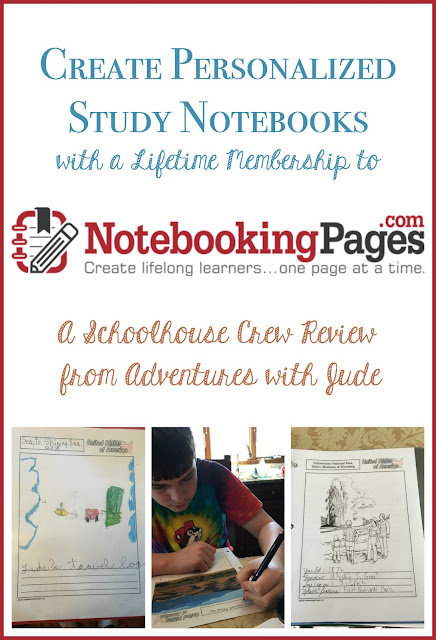

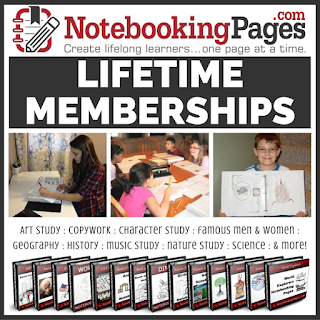
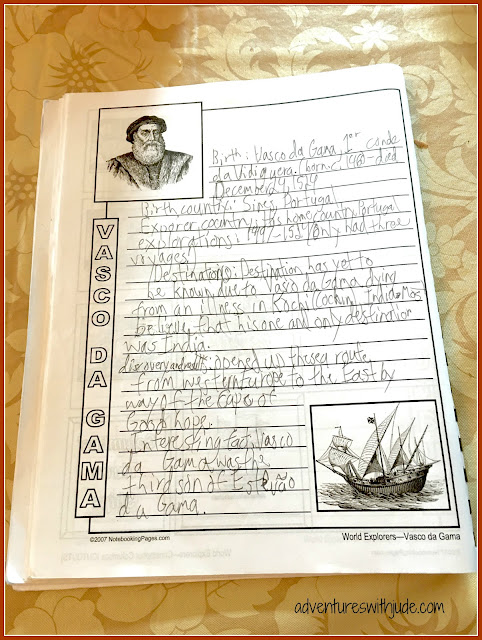
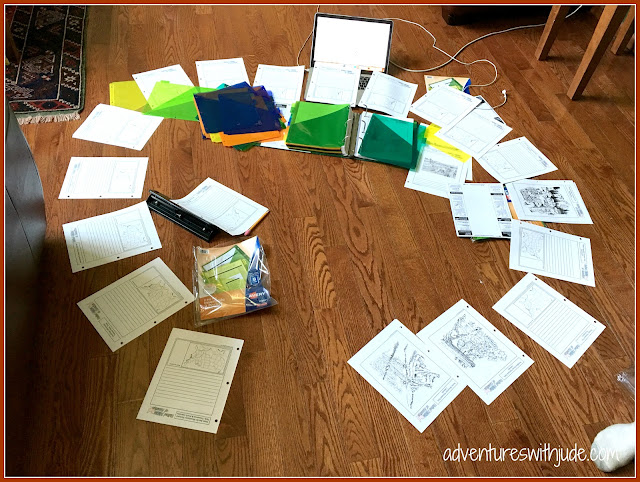

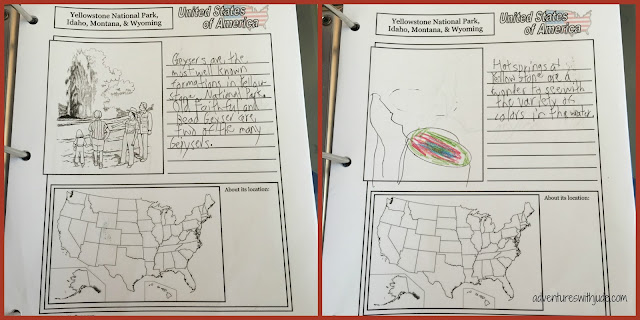
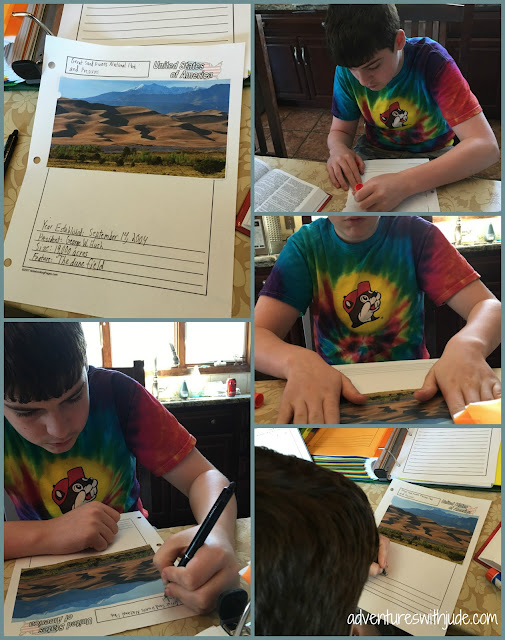




No comments:
Post a Comment